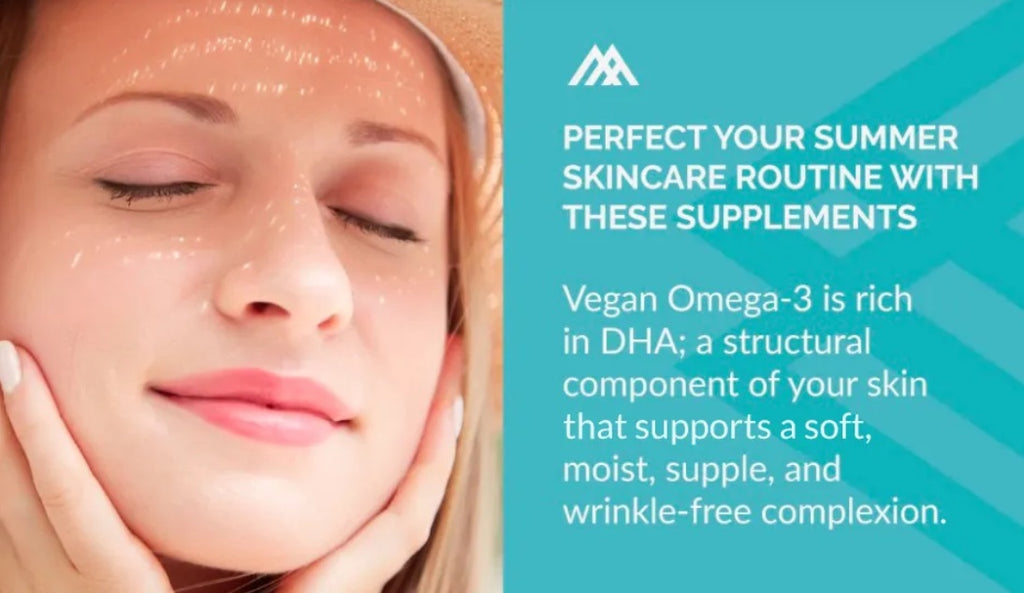Your Cart is Empty

July 06, 2020 6 min read
We have waited long enough --- Summer is finally here, and the fun in the sun can begin! Backyard grilling, sunbathing, dips into the pool, and walks through the park are some of our favorite summer activities. But before you hit the road and make your way into your summer adventures, let's talk about summer skincare. There are supplements that can help protect and enhance your skin from the inside out, all summer long!
Summertime obviously comes with long sunny days, but let's discuss the effects that sun exposure (and overexposure) can have on our skin. The sun's rays, which are ultraviolet (UV) rays, can harm our skin because they have the ability to penetrate the skin. There are three types of UV rays: ultraviolet A (UVA), ultraviolet B (UVB), and ultraviolet C (UVC). The most abundant rays from the sun are UVA, the least abundant are UVB, and the most dangerous are UVC rays. The earth's ozone layer, however, blocks UVC rays, so we are not exposed. UV rays create free radicals in the skin. Free radicals are unstable oxygen molecules that use up energy from healthy cells, causing oxidative stress. As a result, enzymes begin to break down collagen and damage the DNA of the cells.

Take our quiz and find which supplements your body is craving.

Melanin, found in the Epidermis layer of the skin, protects our skin and creates vitamin D. The more melanin a person has, the less likely he or she is to experience sunburn. As our bodies fight against UV rays, the body produces more melanin resulting in the darkening of the skin. If someone gets too much exposure,the skin cells' inner layers can be affected, causing skin cells to die. This results in sun damage.
Sun damage can manifest in different ways, including:
The sun, of course, is not all bad. The UV rays provide our bodies with Vitamin D, which is excellent for healthy bones. It comes down to moderate sun exposure during midday hours to ensure you are avoiding overexposure from the sun; while always being armed with sunscreen.
Vitamin C is well known for boosting the immune system, but it also has impressive antioxidant benefits for the skin. Did you know that our bodies do not naturally create this vitamin? That's right: to get an adequate amount of Vitamin C, you must be intentional about doing so through nutrition (think oranges) and supplements. Vitamin C helps the skin in the following ways:

Collagen, the most abundant protein in our bodies, is responsible for the structure of cells throughout the body. Pretty important, especially if you are at risk for skin damage. As we age, our collagen levels decrease, so it becomes essential to replenish our collagen levels through nutrition or supplementation. Here are the ways in which collagen can help keep our skin healthy:
Vegan Omega-3 is sourced from non-GMO marine algae, so you get all the benefits of fish oil without the unwanted aftertaste. It offers many benefits to the body, such as heart health and joint mobility. However, it also has amazing benefits for the skin, even during the warmer months.

Cleansers: Keep a light cleanser on hand. Because you are sweating a lot more, it is essential to clean your skin thoroughly. Although sweat actually purges the pores, carrying out dirt and grime, if left on the skin too long the dirt and bacteria can settle back into the skin resulting in clogged pores and acne.
Exfoliators:Just like winter months, exfoliating is important if you are hoping to achieve bright and glowing skin—exfoliating sloughs off dead skin cells. However, because of constant exposure to damaging UV rays, it is best to limit exfoliation from your usual 2-3 times a week to once a week. This is because you are removing layers of the skin, leaving your skin more vulnerable to sun damage.
Toner: Sweat and oil build up on the skin during the hotter months. Adding a toner to your regimen will be helpful to combat breakouts from clogged pores. It is also refreshing when you are feeling a bit sweaty and sticky at the end of the night.
Moisturizers: Moisturizing is important, but, unlike the winter, you can keep moisturizers and body lotions light during the summer! SPF has been incorporated within almost all skincare products, even some makeup foundations. It is possible that you can find a light moisturizer that also has an SPF. Because it is hot, you don't want to go too heavy, but whatever you do, find a hydrating (yet light) moisturizer will get you through the summer!
Sunscreen:Did we mention applying an SPF? Never leave the house without it; we can not stress this enough. Sunscreen is a crucial skincare step that you can not afford to skip as it works to protect skin from the UV rays from the sun. Luckily, sunscreen is in everything --- it is even found in some makeup foundations, so you can include it in your beauty routine easily. The best sunscreen to use is a broad-spectrum with an SPF of at least 30 (or higher).
Hydration: Staying hydrated is not only important for the body, but for the skin. The heat can cause dehydration, so make sure you get enough water throughout the day.
Wear a hat: Getting a visor, sun hat, or even putting on a ball cap while outdoors in the sun is a simple and easy way to protect your skin from the sun’s rays.
At Amandean, we are very excited for summer, just like you. We encourage you to enjoy some well-deserved fun in the sun. However, don't forget to maintain a safe summer skincare routine that is paired with a healthy diet, It is tough to avoid sun exposure during the summer months, so we want to make sure you're doing it with the proper sun protection. Check out our full skin health collection in our online store!
UV rays may cause damage to the skin structure and DNA, creating an excess of free radicals.
Melanin is responsible for vitamin D production in the skin, protecting the epidermis against sun damage, including wrinkles, dark spots, and sunburns.
Vitamin C has been found to combat free radicals, minimize the appearance of dark spots, and boost collagen production.
Collagen, one of the main components of the skin, responsible for its hydration, firmness, and cell renewal.
Algae-sourced Omega-3 fatty acids contribute to overall skin hydration, while also preventing the formation of wrinkles.
Your skin requires special attention in the summer, so be sure to wear sunscreen, a hat, and include cleansers, toners, exfoliators, and moisturizers as part of a regular routine.

January 23, 2026 8 min read
Read More
October 17, 2025 8 min read
Find out why creatine is better for vegans! Boost your wellness game and unlock peak performance with Amandean's premium supplements today.